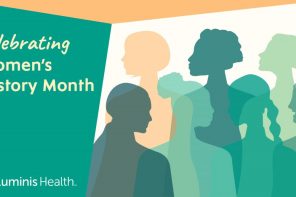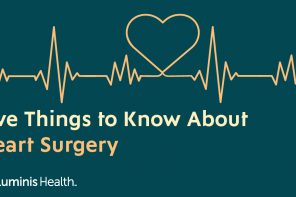As a woman and mother, I understand how easy it is to put everyone’s needs above your own. But as a doctor and cardiologist, I also know how important it is to care for my health – especially my heart.
More than one in three women are living with heart disease, according to the American Heart Association. And although heart disease death rates among men have declined over the last 25 years, rates among women have fallen at a slower rate.
The first step in prevention is education. Some risk factors, such as a family history of heart disease and your age, can’t be changed. For women, your risk for heart disease rises significantly after menopause. In fact, the rate of heart attacks in women dramatically increases about 10 years after menopause starts.
The good news is there are many key risk factors you can do something about.
Cholesterol
Your body needs small amounts of cholesterol to stay healthy, but too much can cause a problem. The extra amounts of cholesterol clog your arteries, putting you at risk for heart disease and heart attack. Work with your doctor to know your numbers and come up with a plan to keep them in a healthy range.
High blood pressure
High blood pressure, or hypertension, is the leading cause of heart attack, stroke, heart failure and kidney disease. It’s called the “silent killer” because it often has no warning signs or symptoms, so many people don’t know they have it. To lower your risk of heart disease, you should maintain a healthy blood pressure. Your doctor will help you decide what your goal blood pressure is how to achieve it through lifestyle changes or medication.
Weight
Carrying excess weight can raise your blood pressure and strain your heart. Being overweight also raises your chances of developing diabetes and high cholesterol. The best way to take control of your weight is to get moving and eat a healthy diet. In our fast-paced world this is easier said than done. Start by making small changes, such as walking for 30 minutes a few times a week, cutting out beverages with empty calories, or pledging to add fruits and vegetables into every meal.
Smoking
Smoking significantly raises your risk for heart disease, as well as a host of other diseases and cancers. If you need help quitting, you can find classes to help at askAAMC.org/events or call 443-481-5366.
Now that you have the power to take control of certain risk factors for heart disease, you should also be aware of the signs and symptoms of a heart attack. Heart attacks in women can present themselves differently than in men. Everyone can experience chest pain, but women tend to experience more atypical symptoms:
- Shortness of breath
- Nausea
- Jaw pain
- Weakness
- Back pain
Don’t ignore or make excuses for these warning signs. Call your doctor or 911 so a heart attack can be ruled out or identified early.
 Jennifer Brady, MD, cardiologist with Anne Arundel Medical Group (AAMG) Cardiology Specialists.
Jennifer Brady, MD, cardiologist with Anne Arundel Medical Group (AAMG) Cardiology Specialists. 



